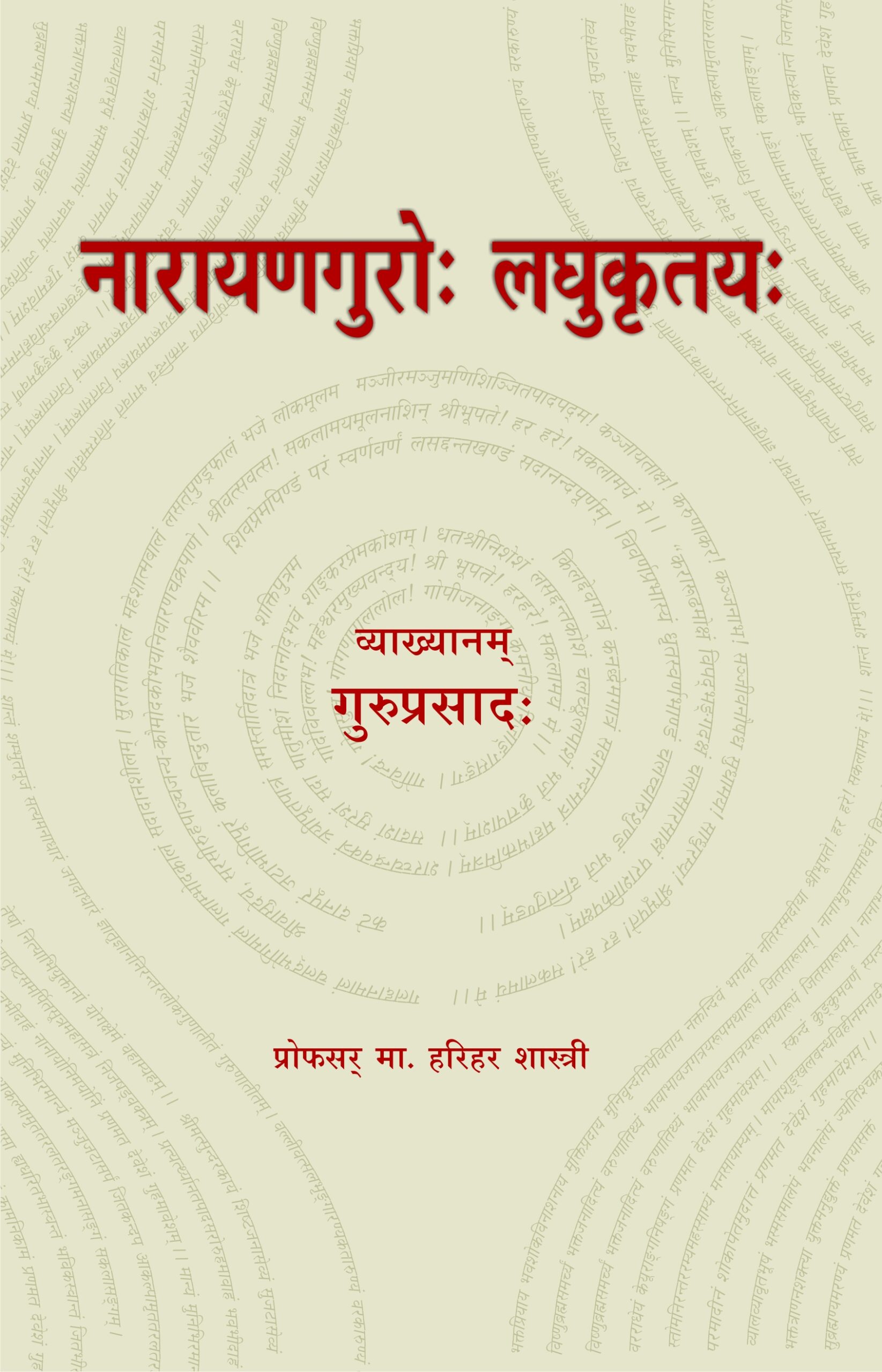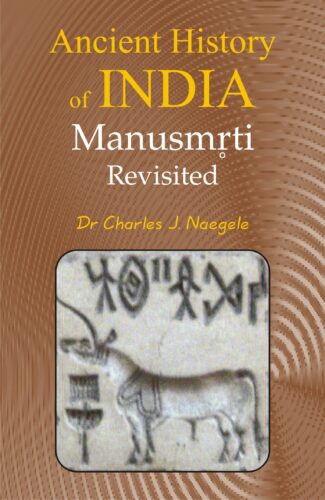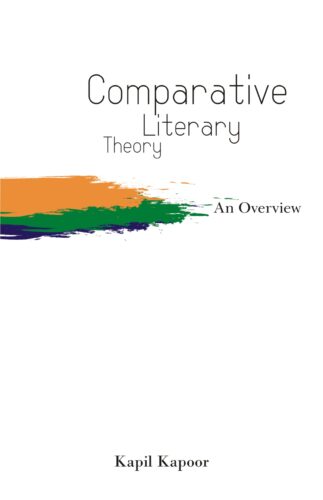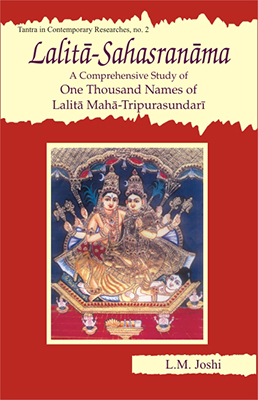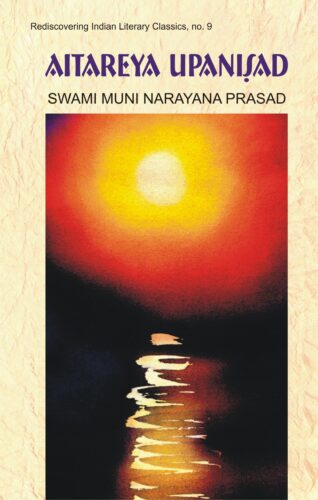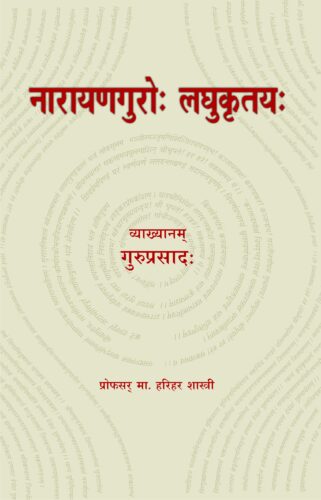
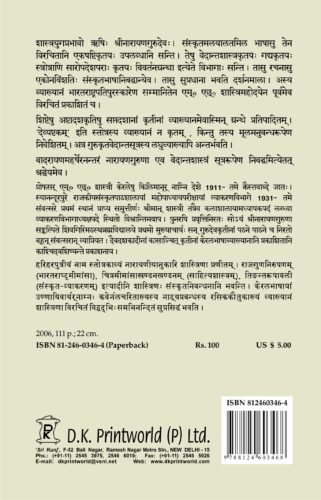
Narayanaguru Laghukr...
Narayanaguru Laghukrtiyah
by: M. Harihar ShastriThe book written in Sanskrit with original verses, provides details of shorter works of Narayana Guru, a great poet of southern India. Comprising 17 chapters, it highlights his anthologies in praise of Lords Ganapati, Subrahmanya, Siva, Visnu, etc.
₹100.00 Original price was: ₹100.00.₹90.00Current price is: ₹90.00.
ISBN: 9788124603468
Year Of Publication: 2006
Edition: 2nd
Pages : 111
Language : Sanskrit
Binding : Paperback
Publisher: D.K. Printworld Pvt. Ltd.
Size: 22 cm.
Weight: 200
The book written in Sanskrit with original verses, provides details of shorter works of Narayana Guru, a great poet of southern India. Comprising 17 chapters, it highlights his anthologies in praise of Lords Ganapati, Subrahmanya, Siva, Visnu, etc.
- Sale!Ancient History of India by: Charles J. Naegele
₹500.00Original price was: ₹500.00.₹450.00Current price is: ₹450.00.This is a fresh look at the history of Ancient India, centering on the Law Code of Manu (Manusmriti / Manu Dharmashastra), and its relationship to Rigveda and its possible relationship to the Indus/Harappan Civilisation of 4000 to 5000 years ago. It also throws light on Aryan society and culture, castes and guilds, use of technology and related practices in the Indus Valley Civilisation.
Dr. Charles Naegele, a practicing lawyer in Silicon Valley, California, USA, and a lifelong student of classical Indian knowledge, has written a work that will be certain to stir up controversy regarding the re-dating of the Law Code of Manu and the well-documented research concerning almost no possibility of Aryan Invasion Theory and the numerous similarities between the text of the Law Code of Manu and the archeological finds from the Indus/Harappan Civilisation.
Scholars and history buffs, as well as everyone who is proud of Indian heritage will enjoy not only this work, but also his future works. - Sale!Comparative Literary Theory by: Kapil Kapoor
₹800.00Original price was: ₹800.00.₹720.00Current price is: ₹720.00.“Two cultures of the world — Greek and Indian — have nourished literature. While the contemporary Western thinking is rooted in Greek thought, especially of Socrates, Plato and Aristotle, and percolated down to the modern European languages with the advent of Christian thought, the multilingual Indian literary tradition has its base from the classical Tamil, Pali, Prakrt and Sanskrit.
Though cultural specificity marks these two traditions off from each other, the universal human condition that finds expression in all literatures binds them together. This book delves deep into the growth of poetics, theory of literature, literary artefacts, aesthetics of literature as an art form, and dramaturgy and philosophy of literature.
Cultures have given forms as their typical expressions — for India great epics, for Greece tragedies, and for England lyrics. Similarly, different ages of a culture find expression in different forms — Elizabethan age of England in lyrics, sixteenth-seventeenth centuries in drama, eighteenth century in prose, and nineteenth century in novel. India’s genius is in epics and its expression unfolds in sravya-preksa compositions, being singable poetry as its preferred form.
This book must serve pretty useful for students and teachers of literature. Also, an invaluable collection for researchers in literature.” - Sale!Lalita-Sahasranama A Comprehensive Study of One Thousand Names of Lalita Maha-Tripurasundari by: L.M. Joshi
₹1,500.00Original price was: ₹1,500.00.₹1,350.00Current price is: ₹1,350.00.In the Hindu sacred literature, Sahasra-namas: the texts embodying literally “the Thousand Names” of a deity, constitute a genre in their own right. And Lalita-Sahasranama (LS) is a veritable classic in the traditional writings of the kind — a classic widely acknowledged for its lucidity, clarity and poetic excellence. A medieval work of unknown authorship eulogising Shakti: the Mother Goddess, this Sahasranama is not just a masterly exposition of Shri Lalita’s cult, but also sets out the deity’s diverse epithets — like, for instance, Kundalini, Nirguna, Saguna, Parashakti or Brahman — which continue to evoke reverence as mantras with ‘mystic powers’. Also included among these names are the goddess’s other panegyric descriptions that have come to have profound, esoteric connotations in tantric practices — epitomizing, thus, the fundamental tenets of tantrashastra. Here is a brilliant critical edition of Lalita-Sahasranama meticulously analysing, for the first time, each of Shri Lalita’s thousand names — by a variety of themes, like the Goddess’s conceptual representations, anthropomorphic forms, disposition, abodes, kinships/consorts, ritualistic worship, and her supremacy in pantheonic hierarchy. Also explaining and interpreting anew these thousand names on the basis of time-honoured commentaries, Dr. Joshi under-scores the high importance of Lalita-Sahasranama in philosophy, tantra, yoga, sahasranama literature, and rituals of various descriptions. The book includes the original Sanskrit text of LS, its romanised transliteration and, additionally, an Appendix listing Sri Lalita’s thousand names in the A-Z sequence.
- Sale!Rasa in Aesthetics by: Priyadarshi Patnaik
₹990.00Original price was: ₹990.00.₹891.00Current price is: ₹891.00.The Indian tradition of criticism is over two millennia old. And its rasa theory has, from the beginning, essentially influenced authors, connoisseurs and art critics alike. First expounded sometime between the 1st century bc and the fourth century AD in the eminent aesthetician, Bharata’s Natya Shastra, rasa theory deals with the ‘emotive content’ of a work of art — how it is depicted, inferred and transmitted. Dr. Patnaik’s book is a unique effort that demonstrates, with diverse examples, the universality of this ancient theory and its applicability to modern Western classics. Elucidating afresh the concept of rasa and all its nine primary kinds largely on the basis of Natya Shastra of Bharata and the commentaries of the tenth-century aesthetician, Abhinavagupta, the book investigates the validity of rasa theory as an aesthetic, more specifically, a literary theory, and how its canons are applicable to modern Western literature as well as Chinese love lyrics and Japanese haiku poems. Dr. Patnaik’s transcultural exploration, thus, covers all major genres of literature — poetry, drama and fiction; and also major writers — Lawrence, Mayakovsky, Kafka, Camus, Conrad, Hemingway, Faulkner, Marquez, Eliot, Hesse, O’Neill, Ionesco, Beckett, Lorca, Neruda and several others. In emphasizing the universal validity of the rasa theory, the author considers certain modern problems relevant to text, meaning and readers’/audiences’ response as well. Very few are the examples of applied rasa theory even in Sanskrit and other Indian literatures, leave alone its application to Western creative writing. This book, with its bold framework and lucid style, should, therefore, fascinate the scholars of Indology, Indian aesthetics and, above all, comparative literary criticism.
- Sale!Aitareya Upanisad by: Swami Muni Narayana Prasad
₹110.00Original price was: ₹110.00.₹99.00Current price is: ₹99.00.Yet another masterly piece of Hindu spiritual wisdom, Aitareya essentially reinforces the grand Upanishadic message which is neither a picturesque mythology nor a promise of heaven nor a threat of hell. It is yet another reminder (from the ancient seers) of our cosmic connection showing how this universe, this phenomenal world of ours, and all that is created, whether movable or immovable, are unfolded from one primeval casual Reality: atman, variantly called the Supreme Spirit, Pure Consciousness or Prajnanam Brahma; and how, in turn, atman perceives itself as the one underlying substance of all these phenomena. A distinguished exponent of Vedanta, Swami Muni Narayana Prasad reinterprets this Upanishad, developing refreshing insights into its textual discourse, its meaning, and its message. Also included in this critical commentary are its original Sanskrit text, Romanised transliteration, and verse for verse English translation. Appended to the Rigveda, Aitareya Upanishad comprises three chapters (IV-VI) of the Aitareya-Aranyaka which, in itself, is a continuation of Aitareya Brahmana. And as one of the principal Upanishads is invaluable as much to the discerning readers as to the scholars of Indian philosophy.


